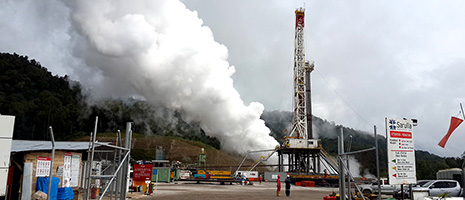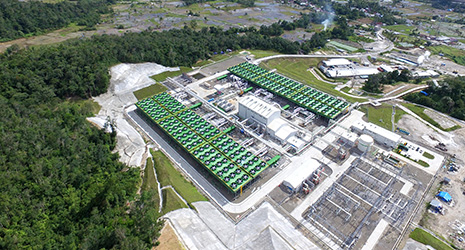Home > Highlighting JAPAN > Highlighting Japan September 2017 > SDGs: Challenges and Opportunities
Highlighting JAPAN


Geothermal Power Generation Benefits All Three Parties
A Japanese company is undertaking a geothermal power generation project in Indonesia that will help to reduce carbon dioxide emissions.
People who peddled goods in other parts of the country by keeping their head office or head family in the feudal domain of Ohmi (present-day Shiga Prefecture) were called Ohmishonin (Ohmi merchants) in the Edo period (1603–1867). The management philosophy of Ohmishonin was sampo-yoshi, which means benefits for all three parties – the seller, the buyer and society. Founded in 1858 by Ito Chubei, a trader from the feudal domain of Ohmi, ITOCHU Corporation is one of the companies that carry on the spirit of sampo-yoshi today. ITOCHU is currently undertaking businesses in a broad range of fields, including textiles, machinery, metals, minerals, energy, chemicals, food, general products, realty, information and communications technology, and finance, with around 120 operating bases in sixty-three countries worldwide. Attaching importance to the sustainability of society, the company has been formulating a sustainability action plan based on risks and opportunities in the respective business fields, implementing the plan-do-check-act cycle and promoting the action plan year after year, taking international guidelines and principles such as Sustainable Development Goals (SDGs) into consideration.
“We believe the spirit of sampo-yoshi, the spirit of wishing for happiness in society, instead of positively rating the pursuit of self-gains only, is connected to the ideas of sustainability and SDGs,” says Akira Kurihara, a member of ITOCHU’s Sustainability Management Department.
The business of renewable energy that discharges virtually no carbon dioxide (CO2), a greenhouse gas, at the point of power generation is one of the businesses ITOCHU is focusing on in connection with SDGs. Climate change is positioned as one of the issues facing the world in SDGs. The implementation of emergency measures for reducing climate change and its effects is set as a target in SDGs.
ITOCHU is taking part in renewable energy projects in countries around the globe, including a solar thermoelectric power generation project in Spain, wind power generation projects in the United States and Germany, and a geothermal power generation project in Indonesia. Among these, the Sarulla Geothermal Power Plant on the Indonesian island of Sumatra, which commenced commercial operation in March 2017, is a geothermal power plant that leads the world in terms of the volume of power generated. Geothermal power generation produces electricity by driving a turbine with geothermal fluids, such as hot water and steam, which are extracted from underground. The geothermal fluids are returned underground after they are used.
“Geothermal power generation enables us to gain energy permanently by managing the extraction and return of geothermal fluids properly,” notes Hisao Nakano, a manager of the Power Project Investment Team for Asia of Power Project Department. “We can use geothermal energy as a key source of electricity because the weather does not change the output as it does in the cases of solar power and wind power.”
Indonesia, which has the second largest geothermal resource in the world after the United States, has adopted a target of raising the ratio of geothermal power generation to total power output from the current level of 4% to 9% by 2026. The country is aiming to address a chronic power shortage and climate change at the same time through efforts to achieve this target.
At the Sarulla Geothermal Power Plant, Units 2 and 3 are scheduled to enter commercial operation in October 2017 and in the middle of 2018, respectively, in addition to Unit 1 that is already in operation. The combined power generation capacity for the three units is 320.8 megawatts. It matches the amount of electricity consumed by approximately 1,900,000 households in Indonesia (whose population is approximately 260 million). Furthermore, the three units are estimated to reduce CO2 emissions to about one-third compared with older power plants in the country where fossil fuels are used.
ITOCHU, other Japanese companies, a natural resource company in Indonesia and a geothermal power generation company in the United States are jointly investing their money in the Sarulla Geothermal Power Plant Project. Financial institutions, such as the Japan Bank for International Cooperation (JBIC) and the Asian Development Bank (ADB), are providing funds to the Project. In addition to making investments, ITOCHU performed the role of a coordinator with the various organizations concerned.
“We took charge of negotiations and coordination with the various public and private organizations concerned. We worked persistently to develop the Project,” says Nakano. “I think that those tasks enable us to display our strengths as a general trading company. We would like to keep working for the expansion of renewable energy around the world, making the most of these strengths of ours.”
ITOCHU is also working to advance SDGs at the Karawang International Industrial City that it is developing and operating in the suburbs of Jakarta, Indonesia. More than 150 companies occupy this industrial park, which measures approximately 1,400 hectares in size. The Industrial City was installed with about 1,200 smart streetlights in 2016 as the first industrial park in Indonesia to have them. Smart streetlights are a system that reduces energy consumption and CO2 emissions by combining high-efficiency LED lighting with modulated light controls. They reduce CO2 emissions by about 40% compared with ordinary streetlights. In further steps, ITOCHU is providing support to local residents, including farming guidance, scholarships for junior and senior high school students, baby food for infants and medical devices for midwives, in addition to growing more than 10,000 saplings for afforestation within the grounds of the Industrial City each year in cooperation with its corporate tenants.
The spirit of sampo-yoshi is spreading worldwide with SDGs, supporting the sustainable growth of companies.
© 2009 Cabinet Office, Government of Japan






